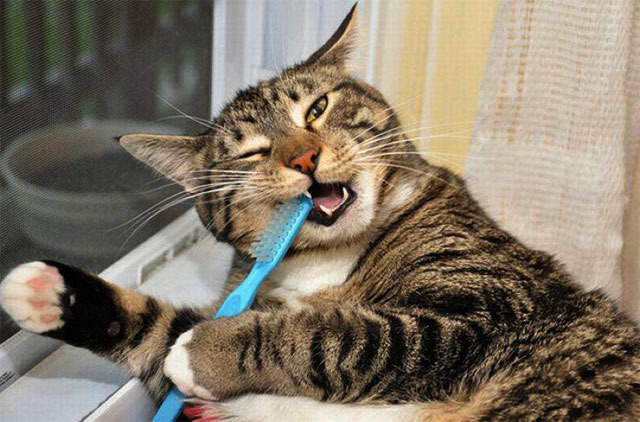
Bad Pet Breath - Don't Ignore It!
29th October 2015
Few things can ruin a nice cuddle with your dog or cat like a case of halitosis! Bad breath, also known halitosis, should not be ignored, especially if it is a chronic occurrence. As with all pet health matters, it’s very important to visit your veterinarian to determine what exactly is causing the bad breath and set up a course of treatment.
Typically, offensive pet breath is caused by tooth and gum disease due to plaque buildup. Your veterinarian should examine your pet’s mouth at each visit and can explain the state of your pet’s oral health. He or she may recommend dental cleanings, which require anesthesia, to prevent and treat tooth and gum disease. Be sure to thoroughly discuss the benefits and risks of this procedure. There are some proactive, preventative measures that you can take before a dental cleaning may be necessary! The most important of these is brushing your pet’s teeth. You brush your teeth every day; so should your pet! Ask your vet to show you how to do this, if you are inexperienced. Also, only use toothpaste designated for pets! Human formulated products can be very dangerous. Other products, such as dental treats and toys are commercially available for cats and dogs! Talk to your vet about your pet’s diet as well; a low quality diet can be a contributing factor in dental disease.
Bad breath may also be an indication that your pet has a more serious medical problem in its mouth, respiratory system, stomach, or internal organs! Bad breath can be a symptom of problems such as foreign objects stuck in the mouth, serious dental injury, periodontal disease, diabetes, nasal or sinus inflammation, enlargement of the esophagus, and bacterial infection. Disease or injuries of the mouth may also be accompanied by other symptoms, such as drooling (with or without the presence of blood), pawing at the mouth, and an inability to eat. Unusually fruity, sweet breath can be a sign of diabetes, and you may also notice your pet drinking and urinating more frequently. Bad breath that smells like urine could indicate kidney disease. Liver issues can be signaled by vomiting, lack of appetite, yellow corneas, and foul breath. If you suspect that your pet’s bad breath may be a symptom of serious disease, consult your veterinarian as soon as possible.

Take some time to check in with your pet! Periodically look for changes in your pet’s appearance and behavior. Being proactive when it comes to your pet’s health and well-being can lead to longer, healthier, happier pet lives!


